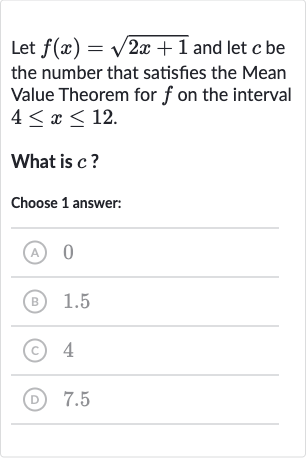AI tutor
Welcome to Bytelearn!
Let’s check out your problem:

Let and let be the number that satisfies the Mean Value Theorem for on the interval .What is ?Choose answer:(A) (B) .(C) (D) .
Full solution
Q. Let and let be the number that satisfies the Mean Value Theorem for on the interval .What is ?Choose answer:(A) (B) .(C) (D) .
- Understand Mean Value Theorem: Understand the Mean Value Theorem (MVT). The MVT states that if a function is continuous on the closed interval and differentiable on the open interval , then there exists at least one number in such that .
- Apply MVT to Function: Apply the MVT to the function on the interval .First, calculate and .
- Calculate Difference Quotient: Calculate the difference quotient .
- Find Derivative of : Find the derivative of .
To differentiate , use the chain rule. - Set Derivative Equal to Quotient: Set the derivative equal to the difference quotient and solve for .Cross-multiply to solve for .Square both sides to eliminate the square root.Subtract from both sides.Divide by .
More problems from Solve quadratic inequalities
QuestionGet tutor help
QuestionGet tutor help
QuestionGet tutor help
QuestionGet tutor help
QuestionGet tutor help
QuestionGet tutor help
QuestionGet tutor help
QuestionGet tutor help
